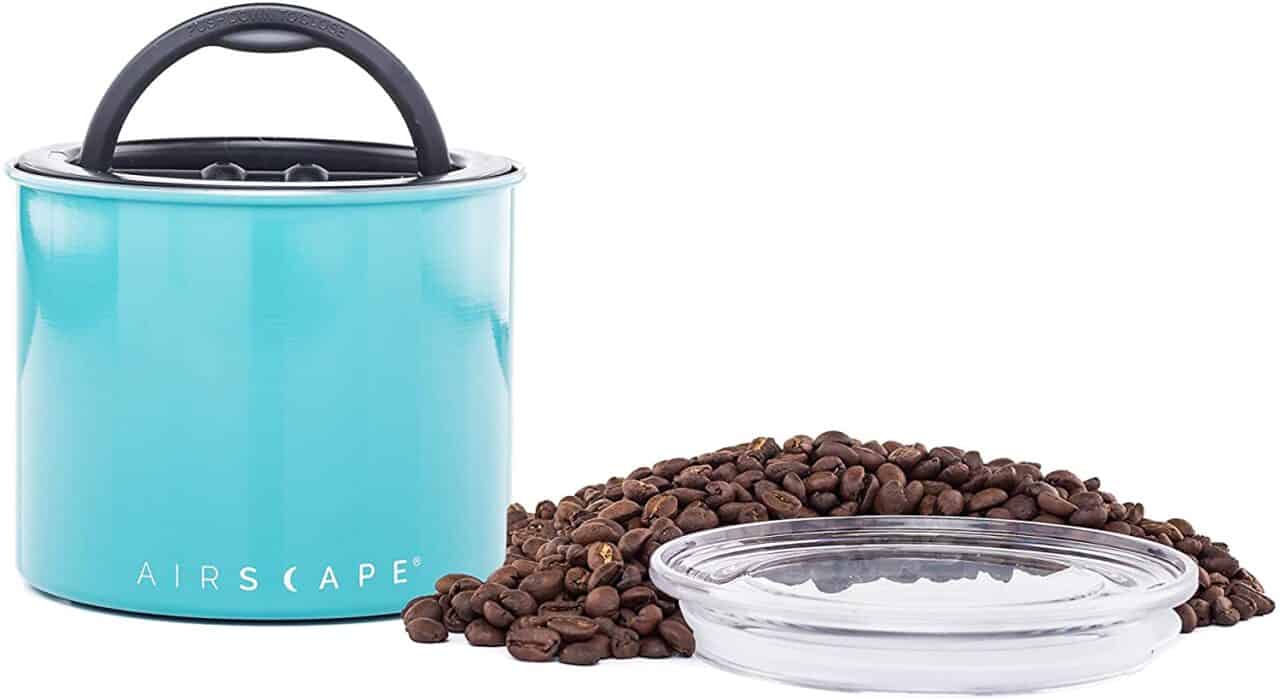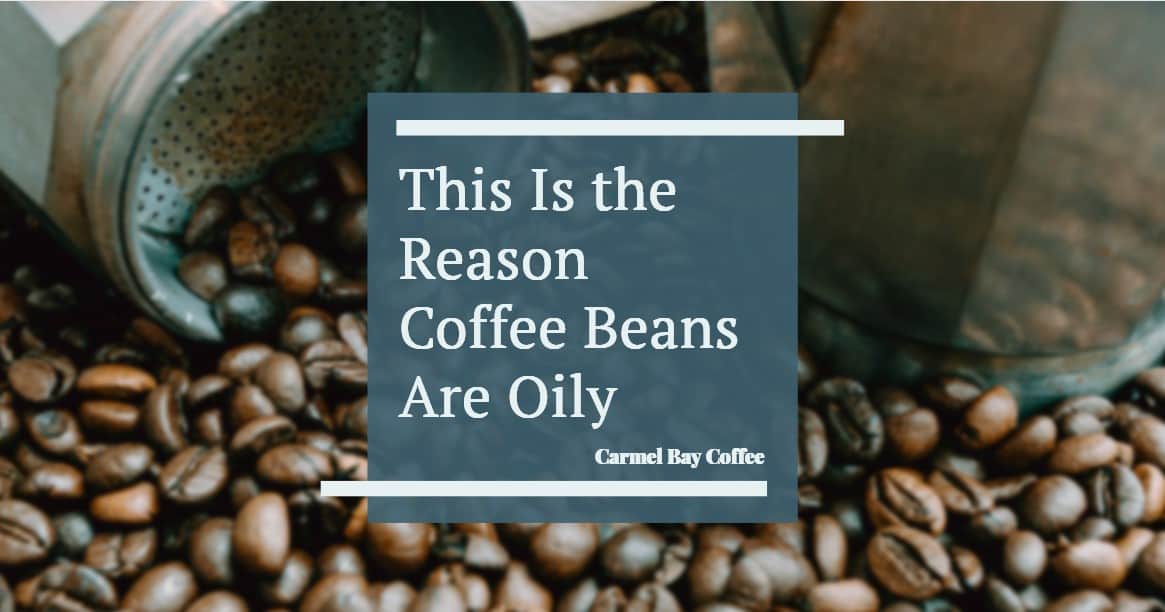Coffee, due to oxidation, is no exception to the rule that nothing lasts forever.
Coffee is a hot item that folks love to stock up on. After all, is there anything worse than getting ready for a challenging day only to find out you’ve run out of joe!
As strong as coffee is, it’s actually an overly sensitive crop that probably doesn’t last as long as you think it does. Let’s take a scientific look at why does coffee oxidized.
The Chemistry of Coffee Oxidation
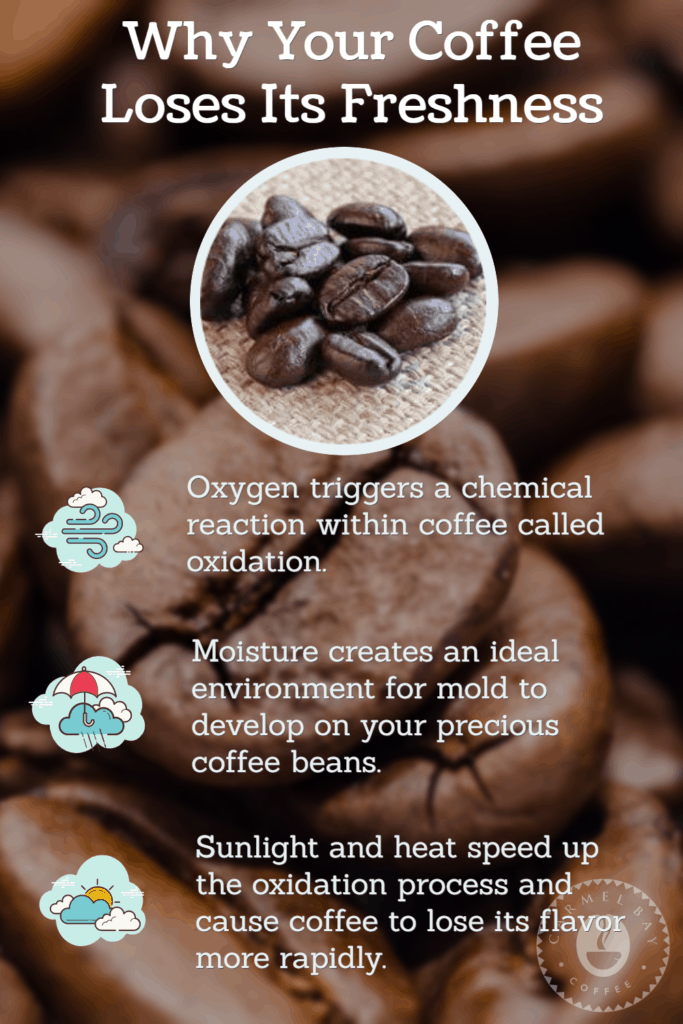
Oxidation is the alteration of certain chemical compounds that have been exposed to the air, more specifically oxygen.
When hydrogen and oxygen bond together, they create water (H2O).
Hydrogen benefits coffee before its bonding with O2, but once it dissolves, it becomes unchained and begins to raise the acidity providing a stale and bitter taste and smell.
Even if you’re not a coffee consumer, you’ve seen this before. It’s what happens when you slice up an avocado and leave it uneaten for too long, and it turns black and mushy. Or when iron is exposed to too much oxygen, it forms rust.
Coffee is no exception. Although your coffee won’t grow rust or become mushy (and if it does, you need to rethink your coffee choices), prolonged exposure to the open air will greatly degrade even the finest of coffees.
Coffee contains a number of oils and acids known as solubles.
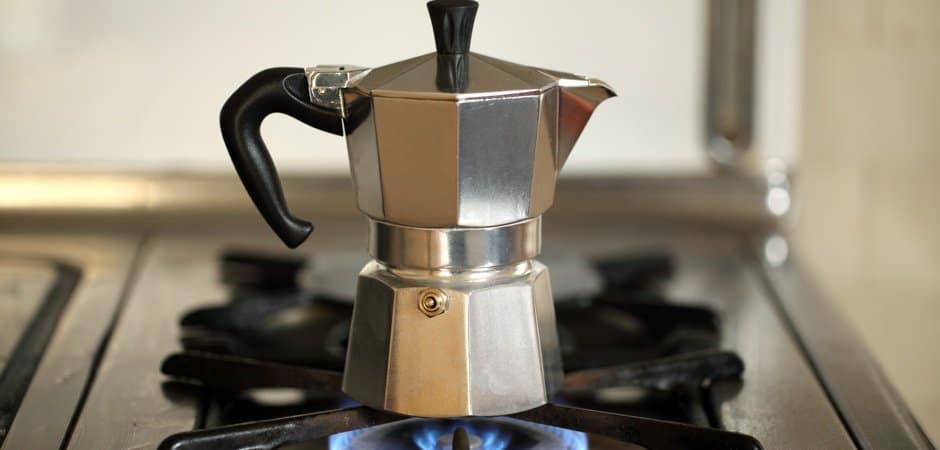
These compounds are responsible for the flavors and aromas. They’re extracted from the grounds providing that familiar taste that we all know and love.
When oxygen comes into contact with these solubles, they immediately begin to degrade and evaporate. It’s why the less coffee you have in a sealed container, the quicker it spoils.
As soon as that pot begins brewing, the oxidation clock starts counting down (again, just like avocados once you slice them).
When coffee cools, the molecules begin to vibrate at a much lower frequency causing increased oxidation. It’s the reason that some believe that cold brew coffees last much longer than standard boil brews.
If you’re interested in Cold Brew Coffee, check out our article on how to make the best Iced coffee at home.
Thoughtco has some good explanations and molecular breakdown of the oxidation process if you’d like to read further.
Are you looking to try something new with a coffee subscription? Check out our guide on the best coffee subscription available here.
Why Does Coffee Go Stale?

Coffee begins to degrade the very second it’s roasted. It’s unavoidable, just as it’s impossible to keep vegetables fresh after they’re picked.
The most obvious reason would be the whole point of this article, oxidation.
But why? Why would the evaporation of these chemicals change the flavor? Well, these compounds are what give coffee its taste in the first place!
Like Arabica coffee beans, coffee beans with high acidity concentrations, like Arabica coffee beans, tend to be on the bitter side despite their high-end quality. The higher the pH level, the more bitter the bean, which isn’t always a bad thing!
Some coffee (like arabica) utilizes these special notes to create unique coffee blends! Healthy pH balances are essential for coffee, but it’s exactly that, a balance. Too much in either direction will ruin the batch. We take a deep dive into the different coffee beans in our article here, A Guide To Choosing The Right Coffee Blend For You.
This is an unavoidable process that begins at the brewing stage.
As soon as boiling water touches those precious grounds, the process begins. This is tricky because solubles emulsify and extract into coffee much more effectively, around 195 to 205 degrees (Fahrenheit), providing fuller flavor.
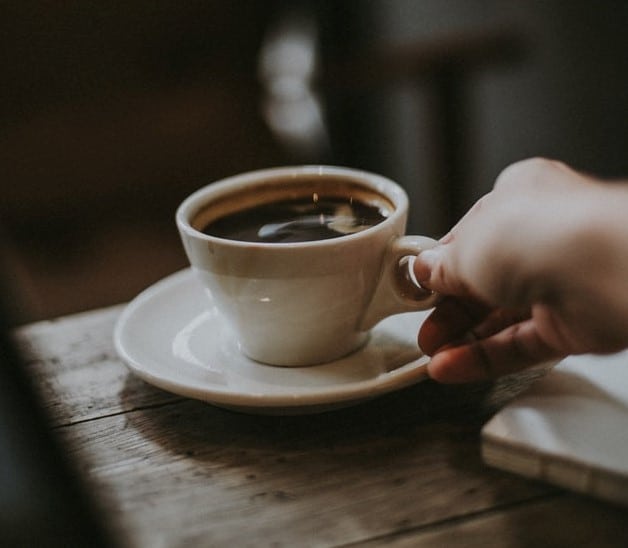
These same high temperatures also cause coffee to oxidize much quicker, essentially causing the second round of oxidation. Your cold brew might last longer, but fresh hot coffee will always be the ruler.
But remember, the quicker coffee cools (try saying that 5x), the quicker it goes stale.
Another reason why a quality coffee flask is essential for portable mud.
Have you ever seen caffeine in its raw state? It’s almost a white powdery substance that tastes incredibly bitter.
Caffeine is very resistant. When all of the aromas, oils, and acids have dissipated into the ether, caffeine will stand its ground. Caffeine can remain in coffee for years after its expiration. We go into it in our article, Does Ground Coffee Lose Caffeine Over Time.
An old cup of coffee might be hard to get down, but at least it’ll still ignite the brain synapsis like a midwestern 4th of July firework display.
How Do You Store Your Coffee?
This is where most people go wrong.
We know that moisture contamination is deadly, but what about sunlight light? Coffee is a sensitive bugger that reacts poorly in too much light, even artificial. Always store coffee in a cool, dry space. The kitchen pantry usually does the trick.
Usually, coffee comes in bags that have a single direction valve attached. It’s that weird plastic button that you find on most coffee bags. It allows the beans to breathe out without letting oxygen back into the bag. So keeping it in the bag, it came in is simple enough.
If you’re like me, you tend to open bags like a caveman. If that’s the case, make sure whatever you use is airtight. A container like this at a reasonable price will do the trick. You can see the current price of the Airscape Coffee Storage Canister here.
Don’t forget that coffee is as sensitive as any other produce item. Its health depends on how you handle it. Remember, dry, airtight, and dark locations.
Keep your coffee away from other pungent items. Coffee is ridiculously absorbent.
Anything with a strong “personality” can be eaten up by the coffee beans/grounds, altering and compromising the flavor.
For optimum freshness and the best bang for your buck, always buy closest to the roasting date instead of the packaging date. This also means only buying the coffee you need rather than stocking up the stuff, as tempting as that may be.
The last thing you want is for your coffee to become stale before it gets a chance to brew. After all, this stuff isn’t cheap.
Ineedcoffee has some other recommendations on how to store coffee.
How Long Does Brewed Coffee Last?
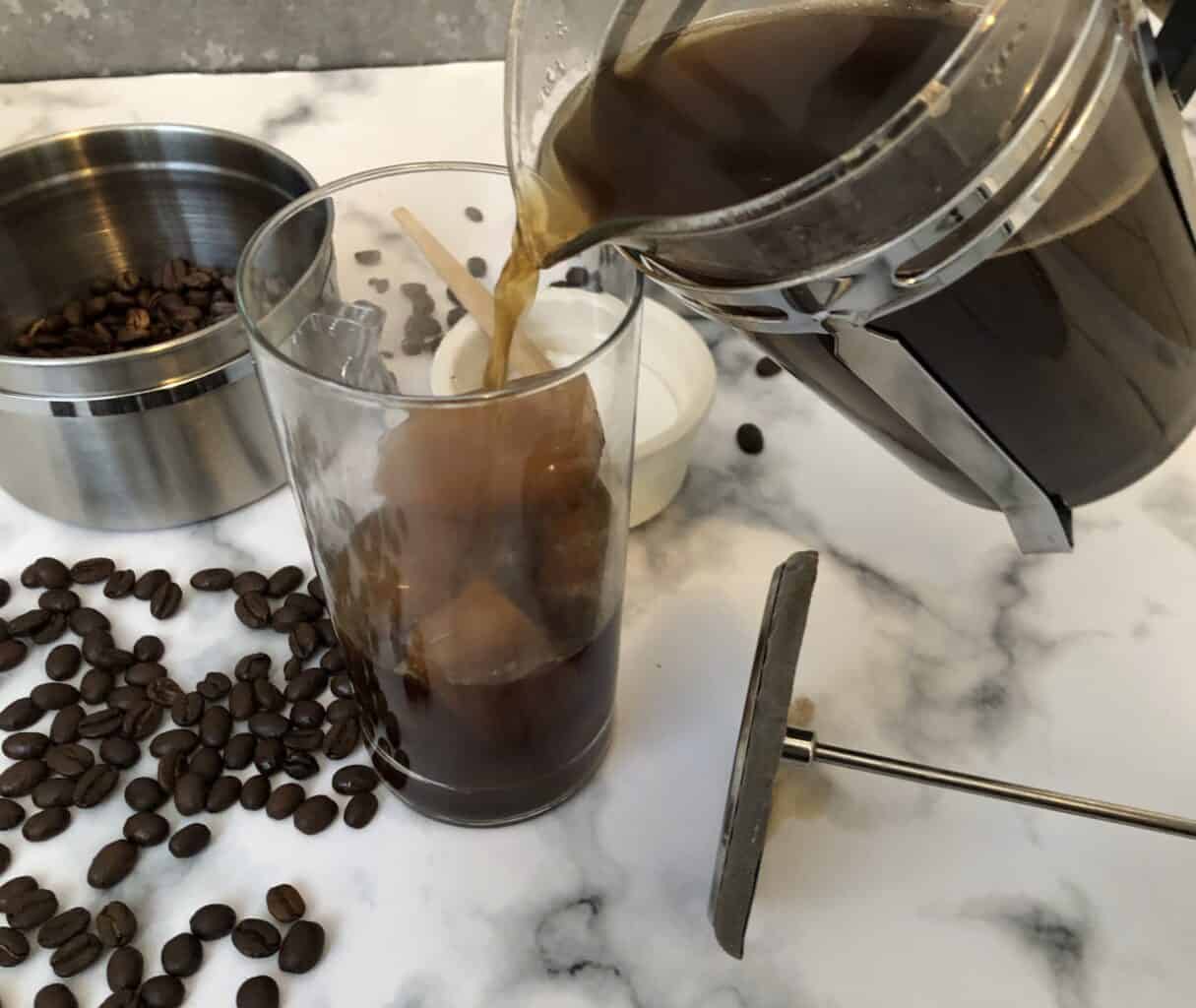
A fresh cup of coffee is at its best consumed within a 30-minute window. If stored in a sealed container and refrigerated, it can retain that same optimal freshness for 1 to 2 hours.
But coffee is drinkable even if it’s past the “fresh” mark. You can safely drink a cup of coffee that’s been sitting at room temperature for roughly 12 hours before risking mold growth. Refrigerated, it can last up to 3 to 4 days. Just don’t expect it to be flavorful. We go into detail about this in our article, Is There Mold In Coffee?
But all coffee is different. Comparatively, different blends possess different properties that either make or break them.
Arabica beans contain significantly higher concentrations of acids than their sister bean Robusta. This means that Robusta beans grip onto its flavor stronger than their kin.
If prolonged freshness is important for you, then don’t add dairy products to the coffee. This is fine for individual cups of java but adding dairy to the entire pot quickens the “danger zone” clock.
You want to avoid any dairy products that have been sitting at room temperature for more than two hours, and even that can be a stretch.
Despite what copious amounts of coffee websites and blogs will tell you, reheating your coffee is not a sin. I’ve reheated whole pots of coffee that I ended up not having time for.
Its flavors were damaged but still provided me plenty of charge. As long as you avoid warming coffee that already has diary, you should be just fine.
How to Tell if Coffee is Rancid
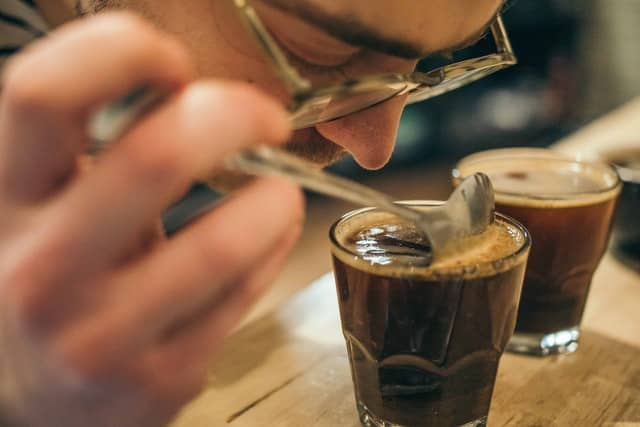
I want to get right out in front of this one and say that coffee grounds and beans don’t really go bad, rather stale, bitter, and flavorless. In most cases, you simply trust your nose. Keep in mind that expired coffee doesn’t have a rotten or rancid odor, rather no odor at all. We have a dedicated article about this topic, This Is How Often To Grind Coffee Beans!
Even when they have “spoiled,” they’re still safe to brew and drink. You’ll just have to deal with its bitterly diminished flavors.
Since coffee is an incredibly dry product, it won’t typically grow mold unless influenced by an outside contaminant, like moisture or other fungi spores. It’s important not to neglect proper coffee storage.
Coffee and mold grow in similar environments, humid and damp environments so that fungal contamination can stem from its cultivation.
Brewed coffee, on the other hand, plays by different rules. Since it’s exposed to moisture when brewing, it will inevitably grow mold. If you’ve ever forgotten to clean the coffee filter for a few days, you’ve definitely noticed the display of white specks.
Last year sometime, I accidentally left my coffee thermos, half-filled, at work. Well, I’d forgotten about it and two weeks turned into ten months, and I had finally wandered back to work to find an entire echo system growing inside of it. Yeah…gross.
If creamer has been mixed in, the clock quickens. Diary can spoil in as little as 2 hours, which will spoil any coffee it’s mixed into.
To sum it up, as long as you keep coffee properly stored and free from invasive elements, it won’t technically spoil. The only thing that will expire is the quality.
Is Stale Coffee Harmful?
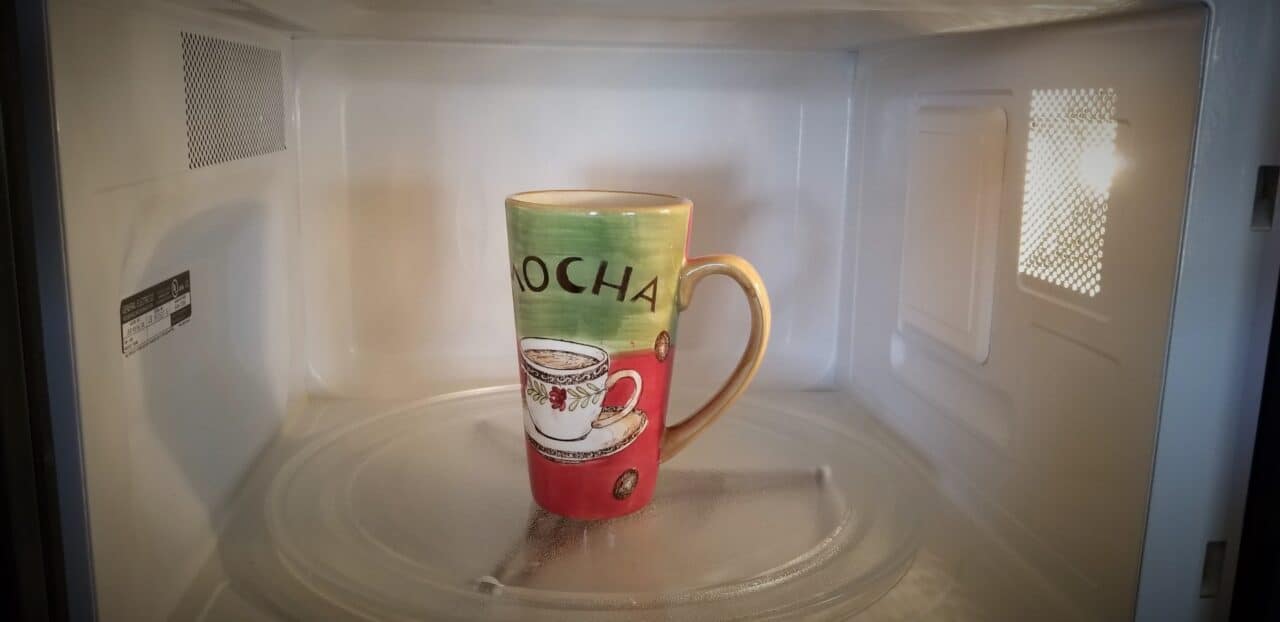
Drinking expired coffee grounds might not be a pleasant experience but should be 100 percent harmless.
But for some (like me), letting coffee I’ve spent hard-earned money on getting stale is harmful enough! Expired coffee is one thing, but contaminated coffee is different. If you need more spending cash for coffee, you can find and play games for real money. With the extra cash you can find, buy more coffee!
Like all other crops, coffee risks exposure to various fungal spores during its growth and yielding. These growths can lead to potentially harmful concentrations of spores called mycotoxins.
This isn’t usually something to fear. Many different crops and grains naturally contain trace amounts. It’s impossible to avoid when farming in large quantities.
Lethal levels of mycotoxins in coffee are rare and usually low enough for your body to process no problem. Some mycotoxins are actually good for you.
There are tons of different mycotoxin variations.
Penicillin is an example of a beneficial mycotoxin used to combat harmful bacterial infections.
One of the more harmful types, and most commonly found in coffee mold, is a carcinogen called Aflatoxin B1. In large unregulated amounts, this toxin can damage your immune system and cause severe fatigue and diminished cognitive thought. It’s also known to affect reproductive development, which makes it especially harmful to pregnant women.
It sounds like I’m trying to scare you away from coffee (maybe to keep it all to myself?), but the reality is that you ingest the toxins every day through multiple sources. The liver neutralizes and eliminates the invaders.
As long as you keep the exposer low (not overdoing it with the java), you’ll prevent the toxins from accumulating and distributing dangerous effects.
It helps to buy coffee as close to the roast date as possible and consuming what you have before stocking up.
Whole Beans V.S Grounds, Which Will Last Longer?
This is among one of the most fiercely debated topics within the coffee realm.
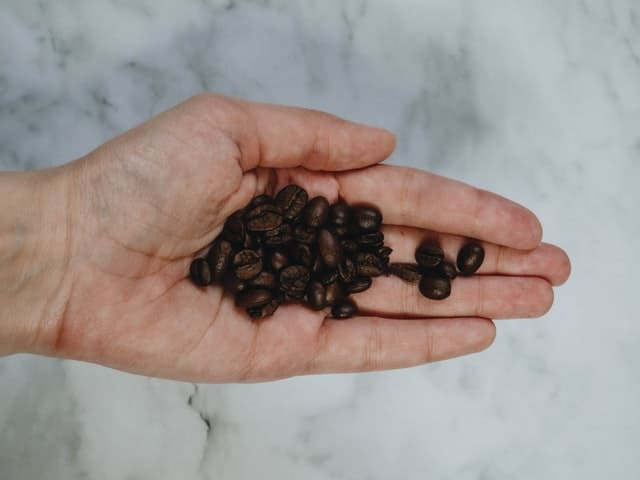
Speaking to their functionality is a matter of personal preference. If you aren’t too much of a morning person and hold a schedule that teeters on the tardy (which I’m part of) grounds are the way to go. Scoop them into the filter and brew. It’s a convenient choice.
They are also easier to store. The fine texture means more options for condensed storage.
For some, grinding your coffee beans each morning is a necessary custom of the morning ritual. Grinding the beans to your desired texture is satisfying and gives more control over your brew.
Some coffee machines will even store the beans and grind them for you when brewing. The noise might wake up the house, but at least they’ll be greeted with fresh coffee!
When it boils down to the quality in your cup, whole beans will always be the winner. They stay fresh for much longer than grounds.
Once beans are ground up and freed from the hard shell, they begin to oxidize much faster. They typically maintain freshness for a couple of weeks.
Whole beans are more protected inside the shell. They can maintain freshness for up to 3 months after their roasting date! Using freshly ground coffee before a brew will give you the best possible results. Perfectdailygrind has more information about whole beans vs ground if you’d like to take a look!
Green coffee beans, which are essentially raw (unroasted), can last as long as two years! This is due to the fact that they don’t undergo the “crack” that occurs when roasting, which exposes the inside of the bean to the air. We go over the “first” and “second crack” in our article, Why Are Coffee Beans Oily?
If you’re shooting for convenience, grounds are the way to go. But if you can spare a little extra time, the sheer quality of whole beans is worth the effort.


